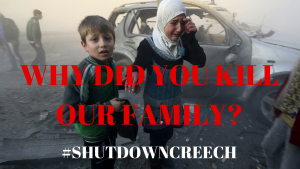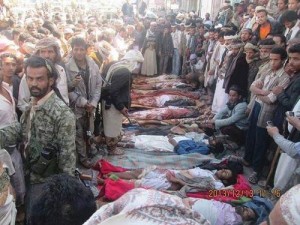Resistance Week at Creech AFB: Nov. 6 – 12, 2016



Drones strikes are not making us safer is not just the conclusion of us protesters, but of leading Academic institutions. In a report issued in September 2012 by the International Human Rights and Conflict Resolution Clinic of Stanford Law School and the Global Justice Clinic at NYU Law entitled Living Under Drones, the authors make the following observations and recommendations:
“Following nine months of intensive research—including two investigations in Pakistan, more than 130 interviews with victims, witnesses, and experts, and review of thousands of pages of documentation and media reporting—this report presents evidence of the damaging and counterproductive effects of current US drone strike policies. Based on extensive interviews with Pakistanis living in the regions directly affected, as well as humanitarian and medical workers, this report provides new and firsthand testimony about the negative impacts US policies are having on the civilians living under drones.
First, while civilian casualties are rarely acknowledged by the US government, there is significant evidence that US drone strikes have injured and killed civilians. In public statements, the US states that there have been “no” or “single digit” civilian casualties.” The Bureau of Investigative Journalism (TBIJ), an independent journalist organization, reports that from June 2004 through mid-September 2012, available data indicate that drone strikes killed 2,562-3,325 people in Pakistan, of whom 474-881 were civilians, including 176 children. TBIJ reports that these strikes also injured an additional 1,228-1,362 individuals. Where media accounts do report civilian casualties, rarely is any information provided about the victims or the communities they leave behind.
Second, US drone strike policies cause considerable and under-accounted for harm to the daily lives of ordinary civilians, beyond death and physical injury. Drones hover twenty-four hours a day over communities in northwest Pakistan, striking homes, vehicles, and public spaces without warning. Their presence terrorizes men, women, and children, giving rise to anxiety and psychological trauma among civilian communities. In addition, families who lost loved ones or their homes in drone strikes now struggle to support themselves.
Third, publicly available evidence that the strikes have made the US safer overall is ambiguous at best. The strikes have certainly killed alleged combatants and disrupted armed actor networks. However, serious concerns about the efficacy and counter-productive nature of drone strikes have been raised. The number of “high-level” targets killed as a percentage of total casualties is extremely low—estimated at just 2%. Furthermore, evidence suggests that US strikes have facilitated recruitment to violent non-state armed groups, and motivated further violent attacks. One major study shows that 74% of Pakistanis now consider the US an enemy.
Fourth, current US targeted killings and drone strike practices undermine respect for the rule of law and international legal protections and may set dangerous precedents. . The US government’s failure to ensure basic transparency and accountability in its targeted killing policies, to provide necessary details about its targeted killing program, or adequately to set out the legal factors involved in decisions to strike hinders necessary democratic debate about a key aspect of US foreign and national security policy. US practices may also facilitate recourse to lethal force around the globe by establishing dangerous precedents for other governments.
In light of these concerns, this report recommends that the US conduct a fundamental re-evaluation of current targeted killing practices, taking into account all available evidence, the concerns of various stakeholders, and the short and long-term costs and benefits. A significant rethinking of current US targeted killing and drone strike policies is long overdue. US policy-makers, and the American public, cannot continue to ignore evidence of the civilian harm and counterproductive impacts of US targeted killings and drone strikes in Pakistan.”


Many veterans and groups such as Veterans for Peace, a co-sponsor of the Creech Resistance Week, are calling for a fundamental re-evaluation because they understand that the present strategy is losing the war and drone attacks cause suffering and that suffering is being turned into hatred against America. In November 2015, four Air Force drone veterans who were based at Creech wrote to President Obama: “We came to the realization that the innocent civilians we were killing only fueled the feelings of hatred that ignited terrorism and groups like ISIS while also serving as a fundamental recruitment tool similar to Guantanamo Bay. This administration and its predecessors have built a drone program that is one of the most devastating driving forces for terrorism and destabilization around the world.”

Where: Creech Air Force Base, Indian Springs, Nevada 89018
REGISTRATION: Please contact Toby: ratherbenyckeling@comcast.net
Deadline to register: October 29, so that we can coordinate work groups for meal planning and prep, etc. Participants will each share in one day of meal preps. Meals will be primarily vegan/vegetarian. Please let us know asap if you plan to come, and if you have food allergies or other special needs.
Coming Actions:
(FMI: Toby Blome: ratherbenyckeling@comcast.net, 510-215-5974)
“









Leave a Reply
You must be logged in to post a comment.